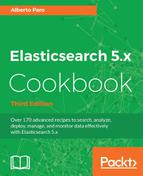In the previous recipes, we have seen how to map different fields and objects in Elasticsearch and we have described how it's easy to change the standard analyzer with the analyzer and search_analyzer properties.
In this recipe, we will see several analyzers and how to use them to improve the indexing and searching quality.
You need an up-and-running Elasticsearch installation as we described in the Downloading and installing Elasticsearch recipe in Chapter 2, Downloading and Setup.
Every core type field allows you to specify custom analyzer for indexing and for searching as field parameters.
For example, if we want that the name field uses a standard analyzer for indexing and a simple analyzer for searching, the mapping will be as follows:
{
"name": {
"type": "string",
"index_analyzer": "standard",
"search_analyzer": "simple"
}
}
The concept of analyzer comes from Lucene (the core of Elasticsearch). An analyzer is a Lucene element that is composed by a tokenizer, that splits a text in tokens, and one or more token filter, that do token manipulation such as lowercasing, normalization, removing stop words, stemming, and so on.
During indexing phase, when Elasticsearch processes a field that must be indexed, an analyzer is chosen, looking first if it is defined in the index_analyzer field, then in document, and finally in the index.
Elasticsearch provides several analyzers in its standard installation. In the following table, the most common ones are described:
|
Name |
Description |
|
standard |
It divides the text using a standard tokenizer--normalize tokens, lowercase tokens and remove unwanted tokens. |
|
simple |
It divides text at non-letter and converts them to lowercase. |
|
whitespace |
It divides text at spaces. |
|
stop |
It processes the text with standard analyzer, then applies custom stopwords. |
|
keyword |
It considers the all text as a token. |
|
pattern |
It divides text using a regular expression. |
|
snowball |
It works as a standard analyzer plus a stemming at the end of processing. |
For special language purposes, Elasticsearch supports a set of analyzers aimed at analyzing specific language text, such as Arabic, Armenian, Basque, Brazilian, Bulgarian, Catalan, Chinese, Cjk, Czech, Danish, Dutch, English, Finnish, French, Galician, German, Greek, Hindi, Hungarian, Indonesian, Italian, Norwegian, Persian, Portuguese, Romanian, Russian, Spanish, Swedish, Turkish, and Thai.
There are several Elasticsearch plugins that extend the list of available analyzers. The most famous ones are:
- ICU analysis plugin (https://www.elastic.co/guide/en/elasticsearch/plugins/master/analysis-icu.html)
- Phonetic analysis plugin (https://www.elastic.co/guide/en/elasticsearch/plugins/master/analysis-phonetic.html)
- Smart chinese analysis plugin (https://www.elastic.co/guide/en/elasticsearch/plugins/master/analysis-smartcn.html)
- Japanese (kuromoji) analysis plugin (https://www.elastic.co/guide/en/elasticsearch/plugins/master/analysis-kuromoji.html)
